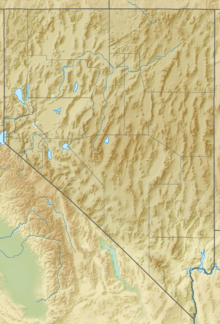Augusta Mountains facts for kids
Quick facts for kids Augusta Mountains |
|
|---|---|
| Highest point | |
| Peak | Cain Mountain |
| Elevation | 2,563 m (8,409 ft) |
| Dimensions | |
| Length | 25 km (16 mi) N-S |
| Width | 9 km (5.6 mi) E-W |
| Area | 140 km2 (54 sq mi) |
| Geography | |
| Country | United States |
| State | Nevada |
| District | Pershing, Churchill and Lander counties |
| Range coordinates | 40°0′57.698″N 117°31′47.403″W / 40.01602722°N 117.52983417°W |
| Topo map | USGS Cain Mountain |
The Augusta Mountains are a small mountain range located in the state of Nevada, in the western United States. These mountains stretch across three different counties: Pershing, Churchill, and Lander.
The highest point in the Augusta Mountains is a peak called Cain Mountain. It stands tall at about 2,563 meters (8,409 feet) above sea level. The range itself is about 25 kilometers (15.5 miles) long and 9 kilometers (5.6 miles) wide.
Where Are the Augusta Mountains?
The Augusta Mountains are surrounded by other mountain ranges and valleys. To the northeast, they connect with the Fish Creek Range. If you look north across a place called Jersey Valley, you'll find the Tobin Range.
To the west, across the Dixie Valley, lies the Stillwater Range. South of the Augusta Mountains are the Clan Alpine Mountains and the New Pass Range. Finally, to the east, across Antelope Valley, you can see Ravenswood Mountain and the Shoshone Range.
A Special Protected Area
A large part of the Augusta Mountains is included in something called the Augusta Mountains Wilderness Study Area. This area covers about 89,372 acres (361.7 square kilometers).
A Wilderness Study Area is a special place that the government protects. It's kept wild and natural, meaning there are no roads, buildings, or other human developments. This helps to preserve the land, plants, and animals that live there for future generations to enjoy.
Home of an Ancient Reptile
The Augusta Mountains are famous for an exciting discovery: the fossil of an ancient aquatic reptile called Augustasaurus. This amazing creature lived during the Triassic period, which was millions of years ago.
Scientists found the Augustasaurus fossil in a rock layer known as the Favret Formation, right here in the Augusta Mountains. The reptile was named Augustasaurus after the mountain range where it was discovered. This shows how important these mountains are for understanding Earth's ancient past and the creatures that once roamed (or swam!) our planet.
 | Leon Lynch |
 | Milton P. Webster |
 | Ferdinand Smith |


